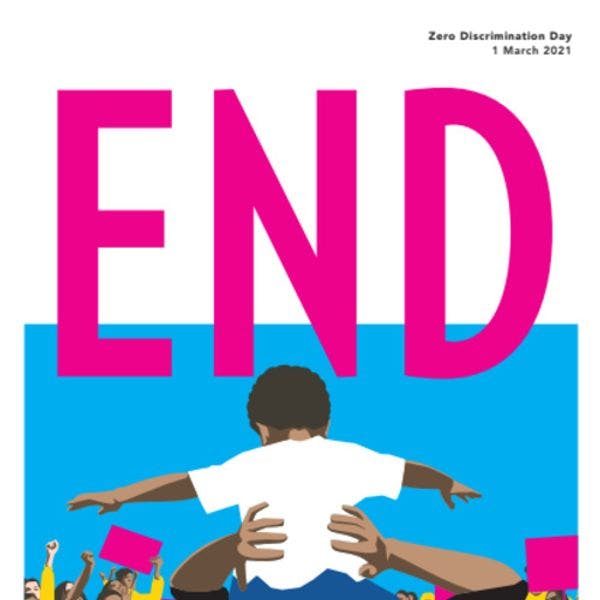Día de la Cero Discriminación – Eliminar Desigualdades
ONUSIDA conmemora el Día de la Cero Discriminación resaltando cómo la discriminación, estigmatización y criminalización impactan en las vidas de las personas. Más información, en inglés, está disponible abajo.
On Zero Discrimination Day this year, UNAIDS is highlighting the urgent need to take action to end the inequalities surrounding income, sex, age, health status, occupation, disability, sexual orientation, drug use, gender identity, race, class, ethnicity and religion that continue to persist around the world.
Inequality is growing for more than 70% of the global population, exacerbating the risk of division and hampering economic and social development. And COVID-19 is hitting the most vulnerable people the hardest—even as new vaccines against COVID-19 are becoming available, there is great inequality in accessing them. Many have equated this to vaccine apartheid.
Confronting inequalities and ending discrimination is critical to ending AIDS. The world is off track from delivering on the shared commitment to end AIDS by 2030 not because of a lack of knowledge, capability or means to beat AIDS, but because of structural inequalities that obstruct proven solutions in HIV prevention and treatment. For example, recent research shows that gay men and other men who have sex with men are twice as likely to acquire HIV if they live in a country with punitive approaches to sexual orientation than if they live in a country with supportive legislation.
Tackling inequality is not a new commitment—in 2015, all countries pledged to reduce inequality within and between countries as part of the Sustainable Development Goals. But it is not yet one that the world has delivered on. As well as being core to ending AIDS, tackling inequality will also advance the human rights of people who are living with HIV, make societies better prepared to beat COVID-19 and other pandemics and support economic recovery and stability. Fulfilling the promise to tackle inequality will save millions of lives and benefit society as a whole. To do this, we must confront discrimination in all its forms.
But to achieve dignity for all, political, economic and social policies need to protect the rights of everyone and pay attention to the needs of disadvantaged and marginalized communities.
Ending inequality requires transformative change. Greater efforts are needed to eradicate extreme poverty and hunger and there is a need to invest more in health, education, social protection and decent jobs.
Message from the UNAIDS Executive Director on Zero Discrimination Day 2021
This year’s Zero Discrimination Day is an especially poignant one.
It was said at first that viruses don’t discriminate. But as we’ve witnessed again, crises, and societies, do.
COVID-19 has magnified the fissures in society. It has seen marginalized communities, who were already on the edge, taking the hardest economic hit, getting stuck at the back of the line for vital services and getting scapegoated for the crisis.
Yet the crisis has also seen the most excluded communities being, once again, the first to step up to help—rooted in their expertise from experience, in their empathy and in their insistence that health for all and a recovery for all is possible.
UNAIDS joins with communities across the world in demanding equality. We say a resolute no to all inequalities—whether because of gender, income, race, disability, sexual orientation, ethnicity and religion. Such inequalities disfigure society and undermine justice and dignity.
We demand an end to discrimination, stigmatization and criminalization.
We challenge all institutions and all people of influence to not only be non-discriminatory, but to be anti-discrimination.
Discrimination kills. It exacerbates emergencies and it perpetuates pandemics.
The world is off track to end AIDS by 2030 not because of a lack of knowledge, capability or means but because of structural inequalities that stand in the way. For example, research shows that punitive laws regarding sexual orientation double the likelihood of acquiring HIV for gay men and other men who have sex with men. Repealing such laws is central to beating the HIV pandemic.
So too, discrimination against migrants and other excluded and stigmatized populations is obstructing their access to COVID-19 testing, treatment and support. This hurts everybody.
We are seeing the discrimination that scars our countries play out also at the international level. As new vaccines against COVID-19 have become available, there has been gross inequity. Just 10 countries have administered more than 75% of all COVID-19 vaccines, while more than 130 countries have not received a single dose. South Africa has called this vaccine apartheid. As the United Nations Secretary-General has said, “Vaccine equity is ultimately about human rights ... Vaccine nationalism denies it.” Around the world, and in every country, we must value every person as equally precious.
Ending inequalities will advance the human rights of all, make societies better prepared to beat COVID-19 and future pandemics and support economic recovery and stability.
We need to ensure everyone’s right to health through publicly provided and financed health care—and provide it respectfully to all, without reservation or judgement.
All of us need to call out discrimination wherever we see it, and to work to set an example.
A healthier, safer, more equal and prosperous world depends on it.
I am inspired by the leadership shown by communities facing discrimination. Their determination, courage and vision is our guiding light. The United Nations stands alongside, as a resolute ally for equality.
End inequalities. Demand zero discrimination.
Winnie Byanyima
Executive Director of UNAIDS
Under-Secretary-General of the United Nations
